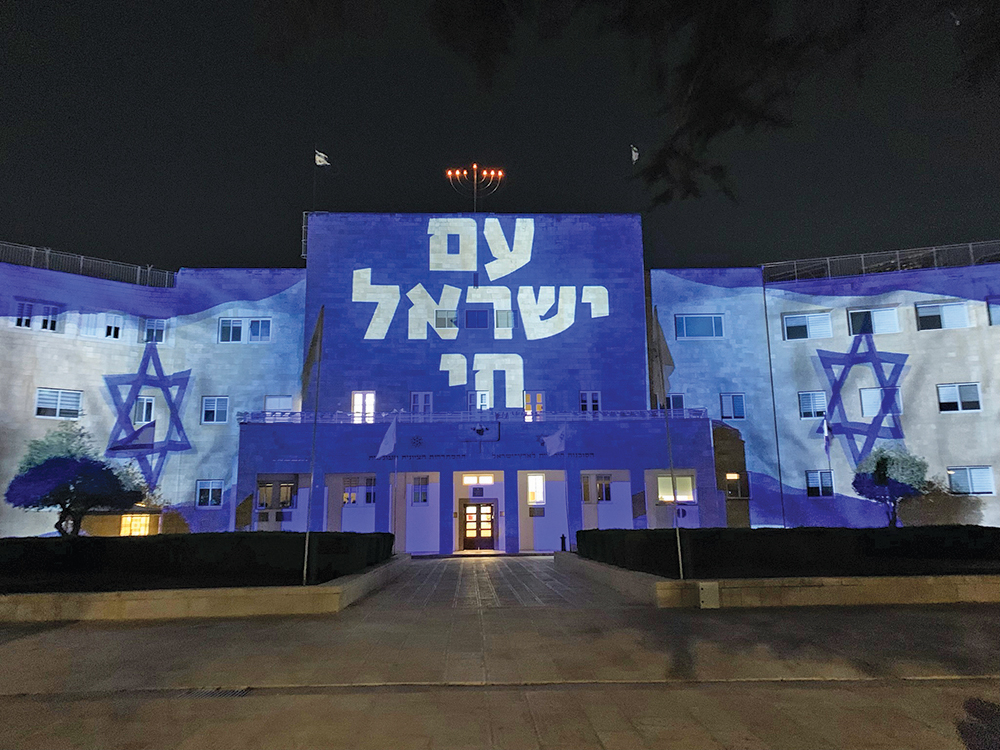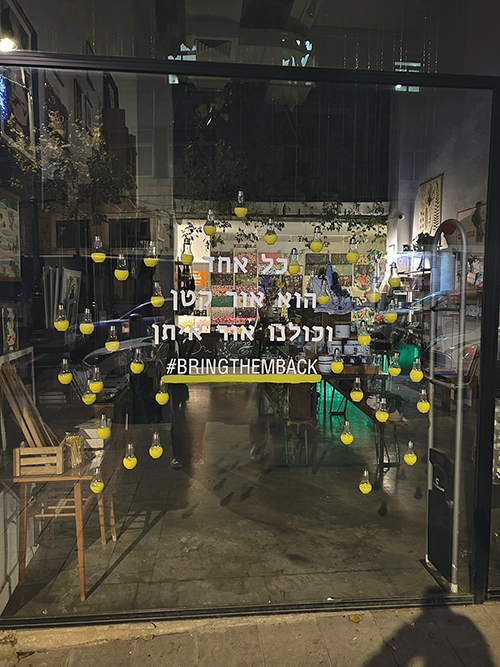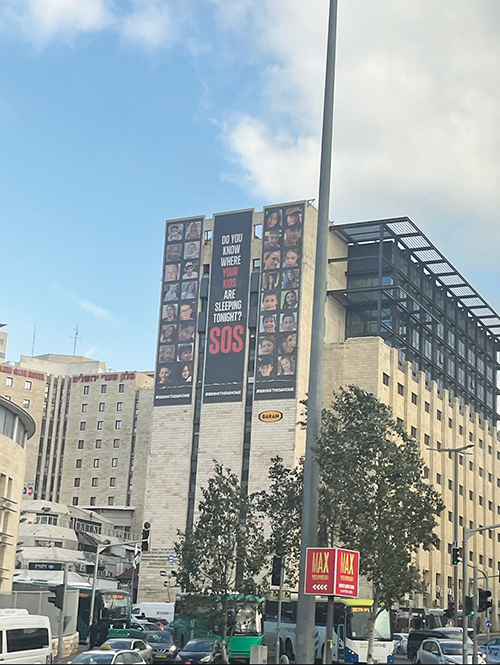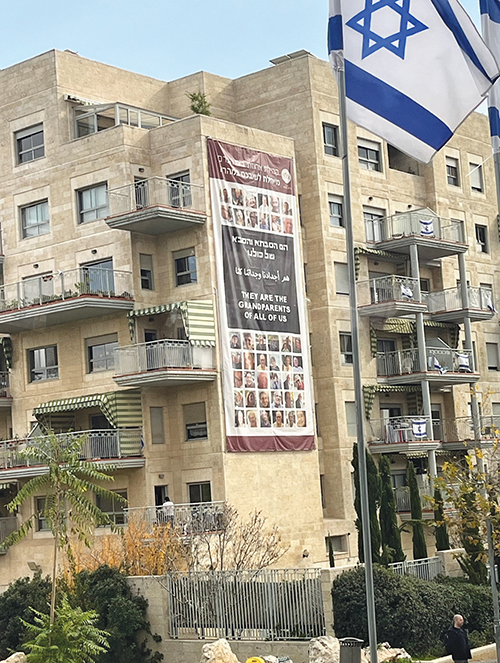
When one comes back from a trip abroad, usually they get together with friends and family, share some fun anecdotes, show pictures and reminisce over the vacation. It’s always a quick conversation—that’s what people expect, you’re not supposed to go over every single detail, just the highlights. I had been to Israel three times before October 7, all on different programs with various institutions. My first time, I was on my Schechter Bergen eighth grade trip, my second time was my senior year Lev v’Nefesh trip with The Leffell School and the third was my gap year with the Nativ College Leadership Gap Year Program. Each time when I got back to America, my response was the same: Israel was amazing! I’d tell a few stories, show off my new jewelry and give family and friends their respective gifts that I had picked up from the shuk or Ben Yehuda Street. Basic etiquette according to societal norms.
This past month I was able to go to Israel as a participant on a solidarity mission through Hasbara Fellowships. When I stepped off the plane I was instantly greeted by the faces of the hostages and large signs pointing to the nearest bomb shelter. A hallway which used to evoke smiles and feelings of excitement, now caused me to reflect on the current state of the country. I looked at the new mural on the wall and knew this trip would be like none other I had been on before. So, my response to the classic question, “how was Israel” wouldn’t be like anything I had ever shared before.
I’ve been home for three weeks now and am ready to go back to campus. I have a pretty solidified response to that question now. It has three parts, too long for a casual conversation and it goes against unspoken social expectations. My answer depends on the person asking and how much I think they genuinely care about Israel. I won’t explain my authentic experiences to those who seem uninterested; Israelis deserve more than that.

So, how was my trip to Israel? The first part of my answer to the question is: healing. After October 7 I struggled. It was hard to be surrounded by so much hate for Israel. I would walk to class and see hostage posters ripped so thoroughly that you could only see the red outline of the top of the poster along with an excessive number of staples. I would go into my apartment and see my roommate and former closest friend at school voice her anti-Israel feelings on all platforms of her social media, including her Snapchat private story and close friends story on Instagram. It was as if her goal was to target me rather than educate her followers. Going to Israel, being in a place that is covered in signs that read: “ביחד ננצח, together we will win” and large, unharmed posters of the hostages was comforting. On a walk around Jerusalem, I found one sign that particularly resonated with me—not because the words were familiar to me because of a Chanukah song but because of its message. The sign read, “כל אחד הוא אור קטן וכולנו אור איתן” which translates to “Every individual is a tiny light but together we are a mighty light.” It was a reminder that I am not alone in my love for Israel, something that sometimes gets lost when being constantly swarmed by opposing viewpoints on campus. I didn’t realize how desperately I needed that reminder until I saw that sign. A sign that the country was healing and so was I.
Even though my light may be small on campus, I know that I am a part of a mighty light.
The second part to the answer is: intense. The trip was very emotional for me, I cried many times. I was exposed to new and terrifying information about the massacre that I had not known before. All of which was said without any filter, no information was sugar coated. When we visited Sderot, the group heard from a speaker who works for Zaka, a group that recovers dead bodies across Israel. He described in detail one house from a kibbutz in the south where he went after October 7. In one room he noticed a “lump,” against the wall, as he got closer, he realized that this “lump” was the body of a 4 year old. In the next room, he found the body of a 6 year old that had a knife inside the skull from the top of the head to the bottom of their chin. Beside it was a hammer with a piece of their skull. All of this was told in a robotic manner, without so much as a tear from his eye. He is numb to all that he has witnessed, and I understand that he has to be to do his job and simply survive. The security guard and medic of our program approached me one night and asked me how to cry. He explained that he is in therapy, he’s trying to cry, but he can’t un-numb himself. There is still a long process that many need to endure to heal from the atrocities committed on October 7.

The third part to the answer is: empowering. It was validating to be surrounded by like-minded peers, to share what we had experienced on our respective campuses—both our struggles and our triumphs. I now feel empowered—even compelled—to be a more vocal advocate for Israel. If my peers can do it, why can’t I? I didn’t feel the same need or drive before, though, to be honest, I had also never experienced antisemitism before October 7. Between the start of the war and my trip to Israel, I have been more silent than I care to admit. I have had people joke about hating Zionists to my face and said nothing. I have had professors share antisemitic remarks about my ability to relate to course material and done nothing. No longer will I stay silent.
Something that I admired about each of our speakers is that despite how dark their session was, despite how uncomfortable they might have been in sharing their story, they always ended on a high note. Israelis, Jews, human beings, often tend to have a glass half-full mindset rather than a glass half-empty. It is so important because it is that hope that will ensure that Israel and the Jewish nation as a whole will live to see a brighter future.
The highlight of the trip for me was Havdala. The program had hired a musician to come with his guitar to sing festive songs for the participants to dance to on the balcony. The music and energy drew in many of the children of the evacuees that were staying in the hotel where we were. They joined in with our dancing and we got chairs and lifted them up, celebrating joyfully. The other program participants and I were each the אור קטן, the small individual lights, once the children joined in, we became, אור איתן, a mighty light. The smiles that emerged on their faces made the whole trip worth it, though it was a small action, it meant everything to me. The mother of one of the children shared that it was the first time her children had smiled like that since the beginning of this nightmare that is this war. The same is true for me.












